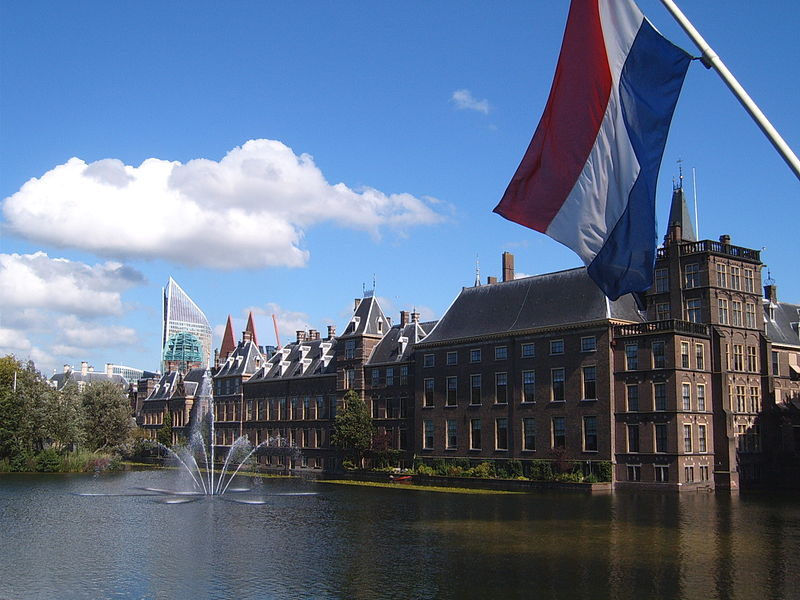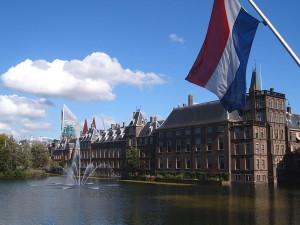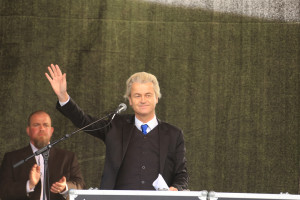Geert Wilders, the Possibility of a “Nexit,” and the European Election Year
 The Dutch Parliament. http://bit.ly/2lZlDzs
The Dutch Parliament. http://bit.ly/2lZlDzs

March 15th, 2017 will once again put Europe at a political crossroads, and could mark the next significant turning point in Western politics. On this day, the Dutch will go to the polls to choose their next government, the first in a series of votes that will shape the future of Europe. The stakes could not be higher — the imminent rise of the right means that the European Union (EU) is again at risk. Populist and nationalist sentiments are gaining ground in Continental Europe, supported by the unexpected and historic victories of Donald Trump in the United States (US) and the Brexit camp in the United Kingdom (UK).
The face of the Netherlands’ own anti-immigrant, anti-Islam, and anti-Europe movement is Geert Wilders, leader of the Party for Freedom (PVV). His blunt talk, patriotic views, and even his haircut are eerily reminiscent of Donald Trump. His popularity among Dutch voters has also never been higher: Wilders has led in the polls since august last year, and is currently in a neck-and-neck race with Prime Minister Mark Rutte’s party- the People’s party for Freedom and Democracy (VVD) – each at 25 seats (out of the 150).
If he does, his promise is to hold a referendum on Nexit — the Dutch version of Brexit. As one of its founding nations, the Netherlands pulling out of the EU could put the integrity of the whole union at risk. To understand Widers’ popularity among Dutch voters, we have to go back about 15 years. 2002 saw an unprecedented wave of right-wing populism emerge, with pioneer politician Pim Fortuyn at the forefront.
Fortuyn’s strong anti-Islam and anti-immigration rhetoric apparently hit a nerve in the Netherlands. He mobilized a significant populist movement against the ruling establishment, who for years had ignored problems associated with the integration of immigrants into Dutch society. Although Fortuyn was assassinated two weeks before the 2002 election, his movement did not die.
Geert Wilders ultimately filled the void left by Fortuyn, becoming the new charismatic leader of the populist movement after leaving the People’s party for Freedom and Democracy. Running on a strong nationalistic platform of “Dutch first,” Wilders unexpectedly won 6 percent of the vote in his first national election in 2006.
Now, with a little more than a week before the next election, his party has consistently maintained their momentum. The strength of Wilders’ growing support is alarming. Nothing appears capable of deterring his popularity, mirroring the peculiarities of Trump’s own unexpected rise in the US, where the businessman was first dismissed as an offensive bully. Much like Trump, Wilders’ own inflammatory rhetoric has landed him in hot water: he was recently convicted for spreading hate speech in a 2016 lawsuit, after inciting a chant calling for “Fewer Moroccans” in the Netherlands. Despite his conviction, this resulted in a surge of support for Wilders in the polls. Additionally, Wilders made headlines when he spoke of “Moroccan scum” on his campaign trail.

Unfortunately, Wilders’ opponents have a hard time getting their own message across. Their relative impotence is all the more clear in the face of Wilders’ fervor. Wilders tweets nationalistic rhetoric on a daily basis, suggesting that he will “Make the Netherlands Great Again,” taking another page from serial-tweeter Trump’s playbook. Ironically for the Freedom Party, abandoning European freedom appears to be a large part of Wilders’ party mission. It is difficult to understand why Dutch voters are so attracted to this message. After all, the small open-economy of the Netherlands has benefited substantially from the four freedoms of the EU (the movement of goods, services, people, and capital): a 2008 study by the CPB, a Dutch government think tank, found that these EU policies yield a 17% benefit towards Dutch GDP.
Voters, however, seem indifferent to this reality, exhibiting a pattern of self-destruction similar to that first seen with Brexit and then with support for Trump’s anti-trade platform.
If Wilders wins the Dutch election in March, it would likely spark the beginning of a turbulent election season in Europe. His victory could provide a crucial boost to the steadily growing populist movements already spreading through the rest of Europe. Far-right French candidate Marine Le-Pen of the National Front (FN), who is campaigning for France’s own Frexit referendum, has a legitimate shot at the French presidency. In Italy, the populist Five Star movement (M5S) could also gain power after the resignation of Prime Minister Matteo Renzi, and Germany’s controversial Alternative for Germany (AfD) party is likewise gaining some traction. Even liberal Scandinavian states like Sweden and Norway, often lauded as hallmarks of stability and progressivism, have seen upsurges of populism.
Of course, Wilders isn’t in power yet, and Europe’s future might not be so grim. In order for Wilders to become Prime Minister and form a government which could call a referendum on Nexit, his Party for Freedom will need to form a majority coalition with other parties. Opposition parties will be a significant hurdle: several have already started to unite to counter his nationalist ethos. Notably, it is also unclear whether a Nexit referendum would even pass. Current polls suggest that approximately half of people in the Netherlands would vote to leave the EU. It is admittedly difficult to put much confidence in polls after they vastly underestimated the populist votes in the UK and the US. If 2016 has taught us anything, it’s that we shouldn’t underestimate the power of populism, particularly in times of crisis and uncertainty.
